disclaimer: this entire class deals with Western philosophy, and ignores other philosophical traditions.
Moreover, I am not a professional philosopher, I didn't even major in it in college.
It has been said that all of philosophy is just a footnote to Plato. This is a bit of an exaggeration, but Plato has had a huge influence on Western thought, not all of it good, in my opinion. It is worth covering him for just a couple of minutes.
Plato lived in ancient Greece about 2.5 millennia ago. He basically thought that the world around us, the one we see and live in every day, is really just a crummy second-rate copy of the Real World, the realm of pure ideas. We can only perceive the Real World with our intellect. Every chair in our world is just an approximation of the True Ideal of Chair, the Form of Chair, that exists in this Real World.
In the early days, that is, up to a few centuries ago, a philosopher was anyone who was curious about the world and investigated it. The distinctions between botanists, astronomers, chemists, etc. were fuzzy. People we would call scientists today were called "natural philosophers". As each field of inquiry got its feet under it, and practitioners developed a body of results, a vocabulary, and a set of accepted methods, different fields split off from "philosophy" and became their own free-standing fields in their own right, with academic departments, journals, and all the rest of it.
Now philosophy is considered a silly thing to devote your life to: "Oh, you majored in philosophy? Great. So, I'd like the large fries with that, and no pickles on the burger." Philosophy is like the neglected mother whose kids have all gone off to college and glamorous high-paying careers, sitting at home begging them to email her once in a while, since they've all unfriended her on Facebook.
So today, what is left for philosophy? Philosophy is now a way of asking and talking about questions that are not clearly empirical. That is, questions that you can't answer by gathering more data from the external world, or perhaps even ask clearly in a way that permits answers to come from the outside world. Personally, I think that people tend to assume matters are empirical when they are not. Of course there is a lot of philosophical argument about what is and is not empirical!
The following is a gross overgeneralization, and there are tons of exceptions and counter-examples.
A little over a century ago, the world of Western philosophy split into two rough approaches. In the English speaking world, people got very excited about symbolic logic, especially that of Bertrand Russell. He and others kicked off a revolution in math and logic, which spread to a lot of other ideas as well, especially language, truth, meaning, and related ideas. These people tried to be mathematical in their rigor and explicitness. I once heard someone say that these philosophers would go to work every day in a white lab coat if they thought they could get away with it. These largely English-speaking philosophers are called the analytic philosophers.
At the same time, philosophers on the continent of Europe, especially the Germans and the French, were coming to grips with the horrors of two world wars and the problems of living in a modern age when the old moral certainties seemed to have been swept away. They concerned themselves with the dread at the center of existence, and man's status in an industrial era, and stuff like that.
If the analytic philosophers all wish they were scientists, the Continentals all wish they were poets. Needless to say, these two crowds tended to talk past each other. As an American, I tend to identify more with the analytics than the Continentals, but not entirely. Generally, the analytics are easier to understand, since they put so much emphasis on mathematical clarity. At times it seems like a point of pride with the Continentals to be as obscure as possible. It doesn't help that all their work is in translation, if you read it in English.
As for philosophy of mind and consciousness in particular, one of the exciting things about this field is that right now there is very active, fundamental debate. People get pretty worked up over this stuff. I want to be clear here that philosophy of mind is not the same thing as psychology, although they are related. Psychology has split off, and is an empirical science. You ask quantifiable questions in psychology and you try to answer them with experiments and studies. You use this data to prove or disprove your testable theories.
Philosophy, on the other hand, seeks to ask the really big, really fundamental questions. How should we think about thinking? What are the big deep questions about minds? Are there any big deep questions about minds? If so, how should we go about asking them, and how might we try to answer them?
Rene Descartes, French, 1596-1650
Rene Descartes was not the first philosopher to think about thinking by a long shot, but he wrote some things that are still argued about today, and in some ways defined the terms of debate.
Descartes engaged in an approach we might call radical skepticism. He doubted everything that was doubtable, including the existence of the external world, and found that he was left with only one truly undoubtable truth.
"I think, therefore I am." Some people quibble over the translation of the Latin "cogito", saying that it isn't just "I think" but something more like "I am conscious".
He went on to prove the existence of God and the external world, using arguments you may or may not find persuasive. For our purposes, the important thing about Descartes is that he is forever associated with dualism. Dual as in "two". He thought the universe was made of two kinds of stuff: physical material, that took up space as it were, and mental stuff, that somehow lived in a whole nother realm, had no mass or size. Note that this is kind of like Platonism, in that you have the apparent world of tangible stuff, and a whole nother realm of something more ghostly and abstract.
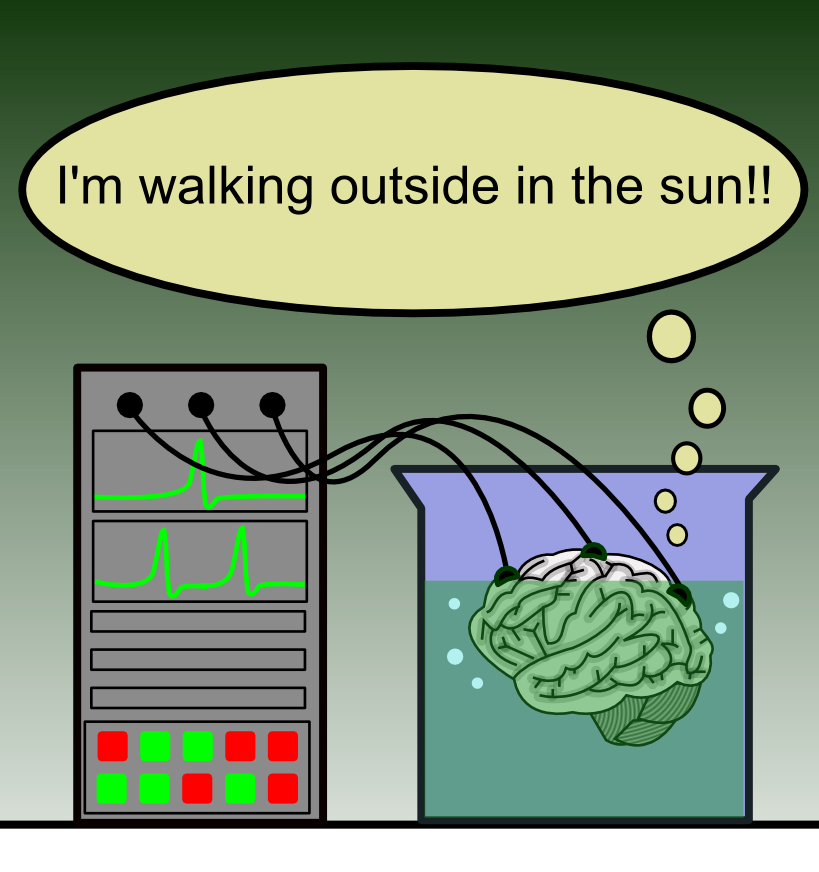
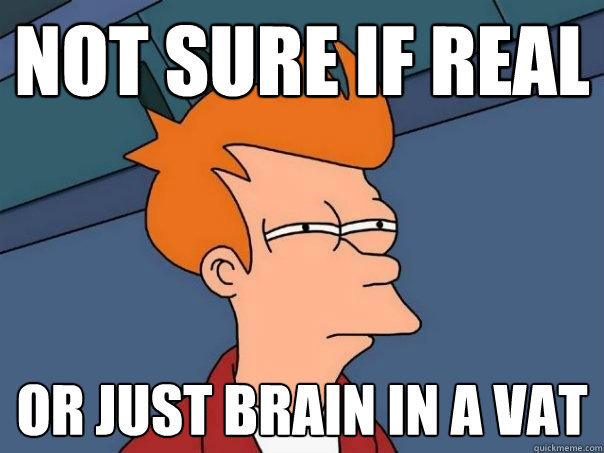
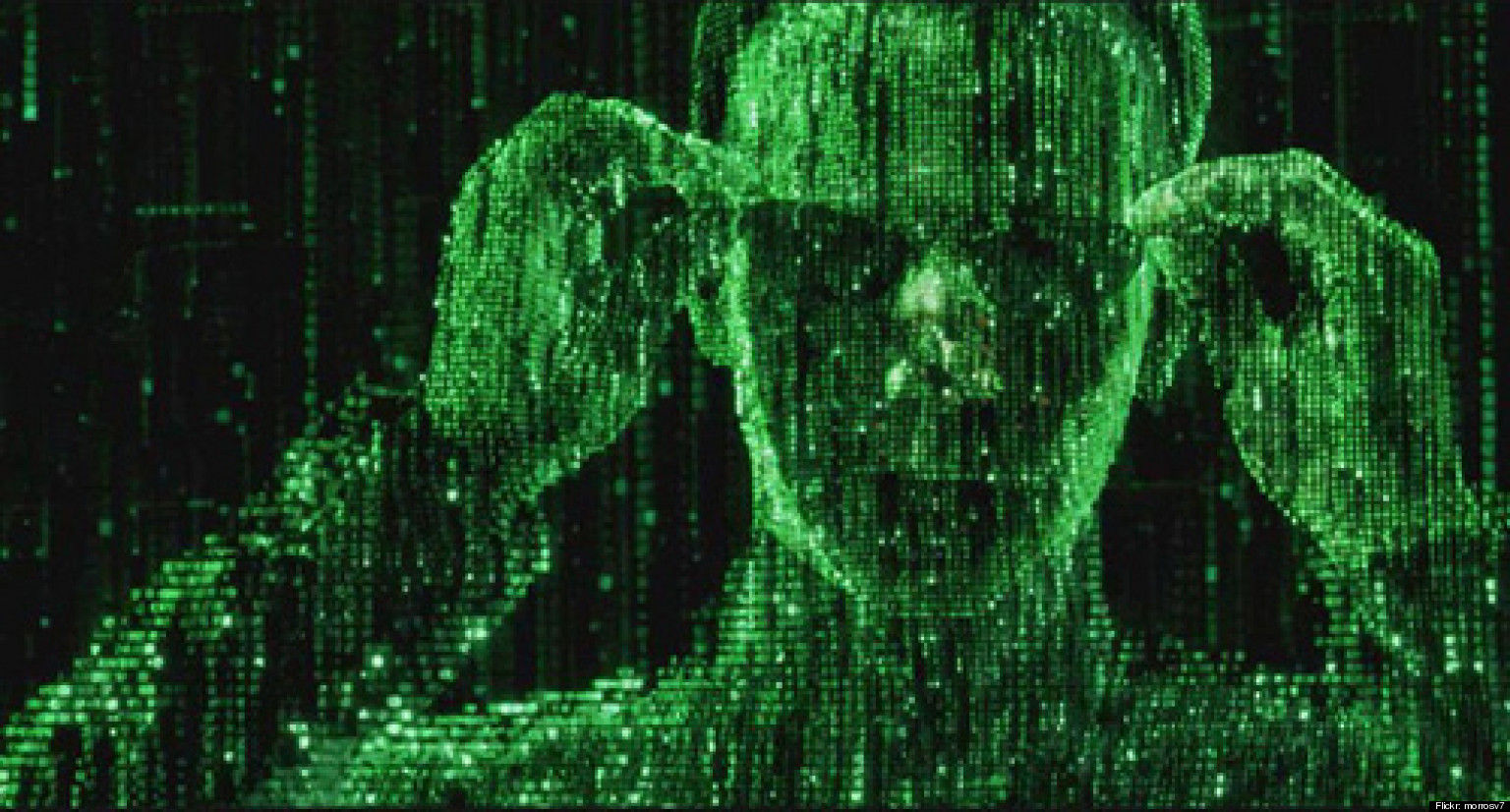
One might ask Descartes about the interface between these two. The brain is material, and makes our nerves and muscles do stuff in the physical world, yet is somehow plugged into this realm of pure mentality. This question is known as the mind/body problem. Is the brain some kind of magical interdimensional portal or something? If the mental realm is entirely non-physical, and the physical realm is entirely non-mental, how do they affect each other? How do physical events influence my conscious perceptions (as they obviously do), and how do my thoughts, like my will, make my physical body do stuff? The interaction of the two realms has always been a big problem for dualists.
With his radical skepticism, Descartes thought about the prospect that we are massively deceived in our perceptions, by the devil, or just some genius deceiver. This gives us the speculation about the so-called "brain in a vat", updated in the movie "The Matrix". If the only contact between our conscious mind and the outside world is through our nervous system, couldn't someone remove our brain and plug it into a giant computer and just pipe in whatever they wanted, so that everything I think I perceive, or have ever perceived, is some kind of artificial simulation?
The adjectival form of Descartes's name is "Cartesian", and he has lent his name to a certain way of thinking about minds: the Cartesian Theater. According to this way of thinking about minds, whatever your brain and senses do, it all gets fed into some single place, a sort of mental theater, where it is presented to your consciousness. This is a natural way to think roughly about how consciousness seems to work. But who is it that sits in the audience of this theater in your head, watching the show?
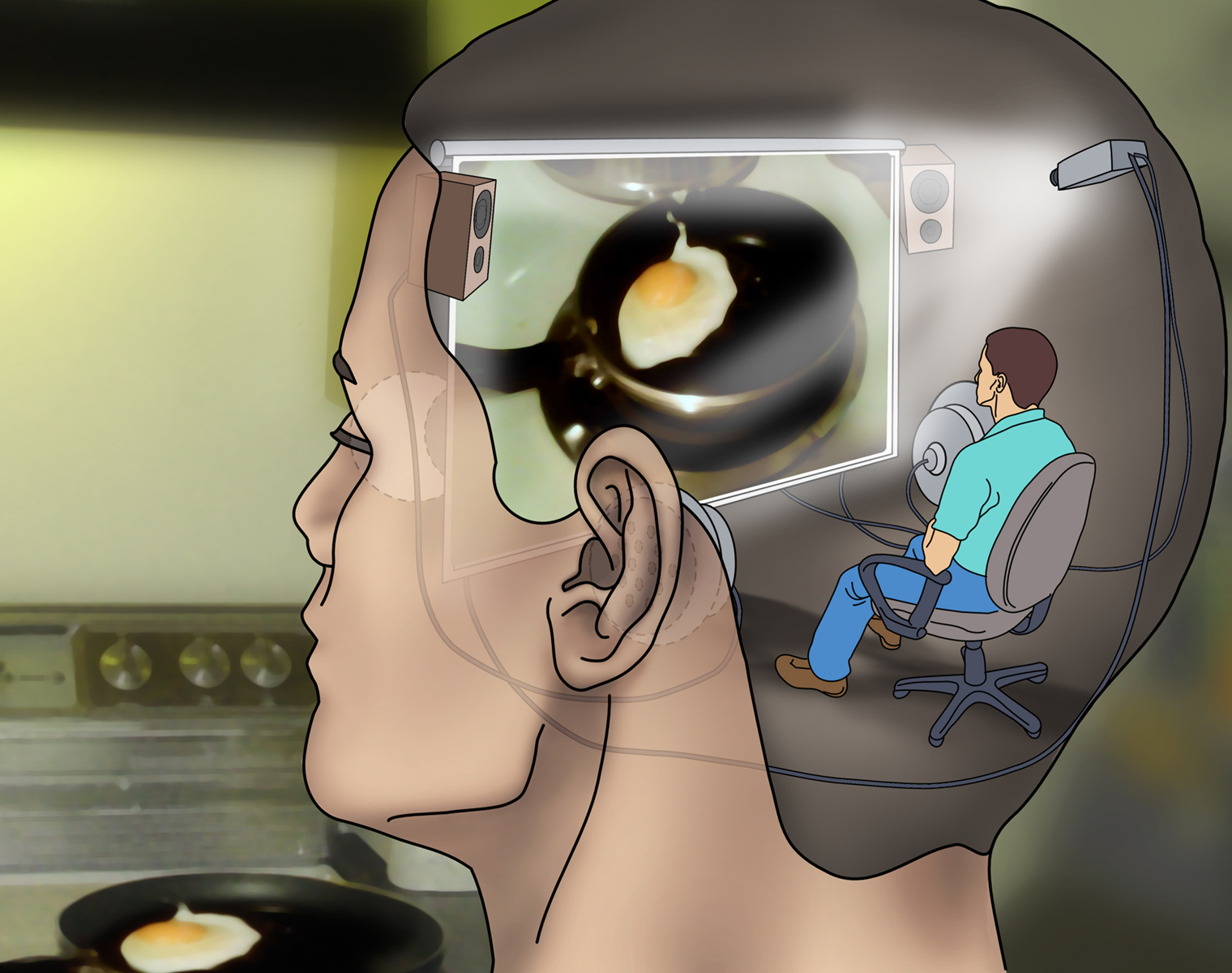
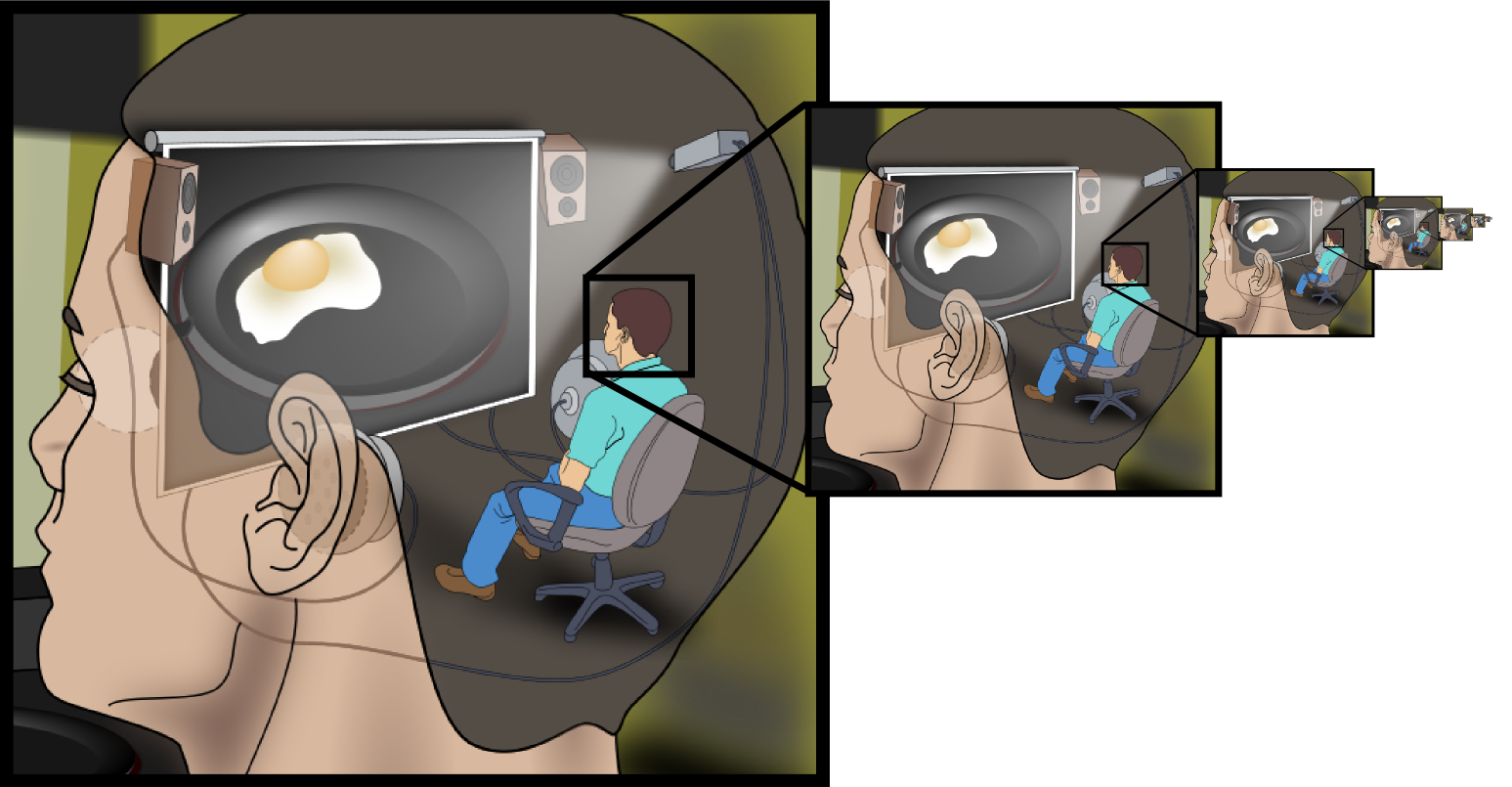
The word homunculus means "little man". No one, including Descartes, thinks that there is literally a little person in your head, or at least one that physically looks like a little person. Nevertheless, one way or another, in Descartes's dualist theory, there would have to be something or someone watching the show in the Cartesian Theater. This, however, leads us to the question of how does this little person work? Is there another little person in its "mind", watching its Cartesian Theater? And so on for ever? This is called the infinite regress of the homunculus. Any theory that involves an infinite number of homunculi, nested inside each other like Russian dolls, can't be right.

I mention Descartes because his distinction between the world of the mental and the world of the physical really laid the groundwork for a lot of the arguments that persist to this day.
William James, American, 1842-1910
Called himself a psychologist, not a philosopher, but today we would call him a philosopher. He was a great writer, and thought deeply about consciousness. He was perhaps the last great writer about consciousness, because after his time, in the early 20th century, at least among Anglo/analytic philosophers, there was a great effort to make the study of the mind as scientific as possible. This meant banishing all gloopy vague words like "consciousness" from academic discourse, and instead focusing exclusively on that which could be precisely measured. The mind was thought of as a black box, with inputs and outputs. This is the doctrine of behaviorism. I call this era the dark age of behaviorism. I have read accounts, and apparently is was really pretty bad. If you were a philosophy professor, you just would not get published, or would not get tenure if you mentioned such New Age claptrap as consciousness.
Fast forward to now, or maybe a generation or so ago. I've been teasing you all up to now, dancing around what I'm talking about. What is philosophy of mind about, anyway? What is the goal here?
People have always tried to figure out how we perceive things, how we think. Throughout the 20th century, and up to now, there have been two very promising branches of human inquiry, broadly speaking, that come at our understanding of the mind from different directions.
First, there is neurophysiology, neuroanatomy. We simply know a whole lot more about the brain itself, as an organ, than people did even a short time ago. We've got all kinds of fancy scanners and devices, and we continue to know more and more about neurons (brain cells) all the time.
Second, about the time we were inventing computers and a little before, people started thinking about computation in the abstract in a more rigorous, penetrating way than ever before. We started inventing whole new fields of study, and defining terms, so now we have theory of computation, information theory, and cognitive science. Nowadays, we have worked out elaborate ideas about how information flows and gets processed, and we have answered questions at great length that no one was even in a position to ask a century ago.
This is all great, and your reaction might be, OK, so what's the problem? Maybe we haven't perfected our scanners, and maybe we still have some open questions about theory of computation, but we are working on it, and certainly we will eventually figure it all out, and we're done. Once we know how brains work on the cellular level, and have an intelligible way of describing all those cellular processes in terms of information flows, information processing, and informational models of the world in our heads, what could possibly be left to talk about? If philosophy of mind is the question, the answer is science.
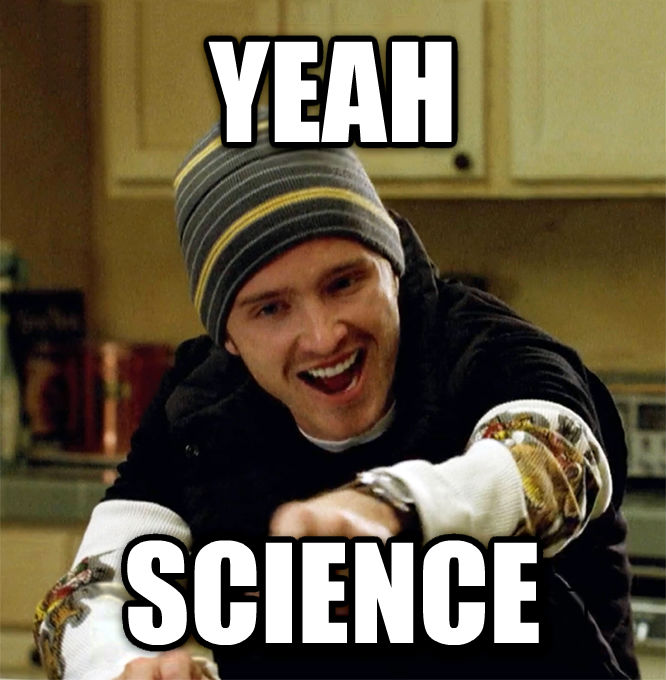
There simply is no such thing as philosophy of mind, when it comes right down to it, just science we haven't quite completely figured out yet.
This point of view is one of the main positions in modern philosophy of mind. I'll call it reductive materialism or physicalism. I will use the terms "materialism" and "physicalism" somewhat interchagably, and this might bother some people in this field. They might also object to my throwing around the term "reductionism", since some of them deny being reductionists, even though maybe they are a little more reductionist than they like to admit. "Reductive" after reductionism, the practice of breaking things down into their component parts, as when we break down biology into chemistry, and chemistry into physics. That is, the practice of reducing seemingly complex things into their presumably smaller, simpler, components. Note that I called reductionism a practice, but it is also a belief - i.e. that this practice can validly be applied to complex things. Since the time of Newton and Kepler, reductionism has been astonishingly successful at explaining the universe around us.
To a physicalist, there is nothing magic about the brain. A consequence of this claim is that if you had a sufficiently powerful computer running the right software (an AI artificial intelligence) it would simply be a mind, in all senses that you are all minds. Your minds happen to be implemented by mushy gray brains housed in primate bodies, but implementation details don't matter here.
It should be clear that physicalists are either outright atheists, or at the very least they believe that any notion of souls or God or the supernatural have no place in our understanding of the world or our minds' place or functioning in the world.
The self-proclaimed captain of the A team, the physicalists, was the late Daniel Dennett, who taught at Tufts. His big book is Consciousness Explained (1991). It is a great book, very persuasive and clearly written. It was a huge best-seller, not just among philosophers. Normal people can read this book and enjoy it.
Who could argue with the physicalists? Sure, some religious people could, but belief in souls is a matter of faith in most religious traditions, and often involves some sort of revelation, either a personal revelation or one by proxy, through a sacred text. For the time being I don't want to start a religious debate, so leaving religion aside for now, who else would argue with the physicalists in this day and age?
Even if we take outright talk of souls seriously, there is still the dualist problem of the spiritual/physical interface that Descartes faced. If we have souls, and they guide our thoughts and actions, including our verbal actions, in any way, surely there must be some place in the brain where physical cells that we can see and measure get pushed around by something . . . soulful. Not just more chemicals, neuro transmitters and stuff obeying the laws of physics.
But it turns out there are some people, today, who argue against reductive materialism, and these people are not motivated by religious beliefs. Moreover, it turns out that these people often do not believe in two completely different kinds of stuff in the universe, so the term "dualism" is not an accurate one to describe their position, even though a lot of people use it anyway. That's why I used the scare quotes above.
The cliche question, the gateway drug, that these anti-physicalists like to ask, the question that causes all physicalists to roll their eyes and groan audibly, is this: what is it like to see red?
Let's say you had a perfect AI running on a sufficiently powerful computer, and this computer was hooked up to a video camera. If you point this camera at a sunset, this AI might be able to write a poem that could move you to tears about the depth of color in the sunset, and the beauty of it.
But any video camera is just projecting light onto a fine array of photosensitive pixels, and these all register the light with numbers, that are then read, and processed, and averaged together, and filtered, and digested, and ultimately fed into some algorithm, or computer program. It's just calculating on numbers. Its calculations might be terribly complex and lightning fast, but they are just numerical calculations, and the result, even if it takes the form of the most evocative poem ever written, is just the result of number crunching.
The point is, say these anti-physicalists, or "dualists", that we have no reason to believe, just on the basis of that computer's behavior, that at any point in its processing, it sees the redness of red the way you and I do when we look at a vivid sunset. They say there is no reason to think that a whole lot of calculating could ever result in the perception of redness. According to these folks, there is an explanatory gap: once you have explained everything that science could explain, and done so perfectly, there will still be stuff left over you haven't explained.
Here's where it gets controversial.
The physicalists say, "Are you crazy? What are you talking about? What do you think your retinas are, anyway, but a pixel array, feeding impulses to your optic nerves? What do you think the brain is, but a very complex electrochemical computer? How do you think we work? We're conscious, right?"
To which the anti-physicalists say, "You know, you're right. How is it possible that we are conscious? There is some deep mystery here."
At which point the physicalists usually mutter "Oh for the love of God." and throw their hands up in the air.
The "dualist" side of this debate places a lot of emphasis on the "raw feels" of experience: the redness of red, the taste of salt, tickles, itches, pains, etc. Collectively these are known as qualia, singular quale. For this reason, I like to call these people "qualophiles" rather than the usually inaccurate "dualists". ("Qualophile" = "qualia lover") The kind of mental activity involved with qualia is also called subjective qualitative consciousness, or phenomenal consciousness.
I want to emphasize here that qualia, the basis of this sense of the term "consciousness", is not the same thing as the more cognitive functions of the mind, those mental functions involved with information retrieval and processing, the ability to reason or think abstractly, or even necessarily the sense of self (at least in the sense of being able to identify a self as opposed to not-self.)
The qualia are the answer to any question that starts out "what is it like . . .?" Sometimes people even speak of the what-it-is-likeness of experience. Qualia are sometimes referred to as "ineffable", which just means that there is no way to define them using words - you just have to experience them. Note well that we aren't talking about anything weird or controversial here, no ESP or paranormal anything, not even anything too complex, like love. Just good old, meat-and-potatoes ordinary everyday basic experiences - like seeing red.
The captain of the qualophiles is the Australian David Chalmers, and his big book is The Conscious Mind (1996). To be honest, Chalmers's book is not as accessible as Dennett's book, and gets a little dense in places. Chalmers himself strikes me as a somewhat reluctant poster child for the qualophiles, but he did draw together a lot of arguments that had been kicking around for some time and articulated them all in one place.
Chalmers says that the physicalists and the brain scientists are well on their way to solving the "easy" problems of consciousness: how we process information, store it, report on internal states, implement goals, etc. All the stuff a complete AI could do. He emphasizes that the easy problems aren't really easy - it could still take another hundred years to solve them. But we can see how it might go.
In contrast, Chalmers says, the Hard Problem of consciousness will still stand there: why should any of this amazing information processing result in the redness of red?
It remains an open question just how basic, or primitive, qualia must be. The paradigmatic case is, of course, the redness of red, and some people take from that the conclusion that qualia must be as simple as can be, cognitively irreducible. Others, however, say no, there is a what-it-is-like to think all kinds of cognitively complicated thoughts, so qualia are not limited to the lowest-level "raw feels".
I want to point out that I have perhaps oversimplified here by dividing philosophers of mind into these two opposing camps, the physicalists and the qualophiles. I'm sure there are lots of philosophers who would be insulted that I'm artificially polarizing the field and defining everything in terms of this one conflict, without regard to the nuances, subtleties, and the whole spectrum of opinions in the field. There are also philosophers of mind who perhaps don't think the Qualia Wars are that big a deal.
I disagree. I think the Qualia Wars are the main event, and everything else is a sideshow. Sometime in the future, one side or the other will turn out to have been simply dead wrong, and the other side will turn out to have been right. It really is that simple. In my experience, just about every philosopher of mind turns out to be on one of these two sides.
The qualophiles have come up with some so-called thought experiments to help convey a sense of what they are talking about, and to illustrate (they hope) that there really is space for daylight between "mere" information processing on one hand, and full-blown consciousness on the other.
Gottfried Leibniz (1646-1716), the co-inventor of calculus back in the 1600's, said this:
". . . Supposing there were a machine, so constructed as to think, feel, and have perception, it might be conceived as increased in size, while keeping the same proportions, so that one might go into it as into a mill. That being so, we should, on examining its interior, find only parts which work one upon another, and never anything by which to explain a perception. Thus it is in a simple substance, and not in a compound or in a machine, that perception must be sought for."
What if you had someone who through some kind of mutation, or maybe they are a space alien, who sees red when you see green and vice versa? Their entire perceptual color spectrum is inverted. They might, in fact never figure out that when everybody else talks about red, their perception is of a completely different color than their own, since they would agree about what all the colors are called. When we and they look at a red apple, we will both call it "red". My inverted spectrum twin and I are both processing the same information about the world, yet our perceptions are different. There must be something about color qualia that is just what it is, beyond "mere" information processing.
Thomas Nagel, in 1974, wrote an essay in which he asked what it is like to be a bat. You know how bats do that freaky thing with echolocation to target bugs to eat? What is that like to the bat? It must be a whole quale we just don't have. We could map every single neuron in the bat's brain and each information flow, and we could know every single thing that happens as the bat does this trick, but we still won't have really answered the question. Even once you know how it works, you won't know what it's like.
Frank Jackson, in 1986, came up with the following thought experiment. Imagine Mary is a super-genius brain scientist. She knows everything there is to know about the human brain and sensory apparatus. But she has been raised and trained in an entirely black and white room. She has never seen color personally, even though she knows exactly what would go on in every single neuron in her brain if she did see color. She knows just what she would say, how she would act, etc. So - what happens on the day that she is finally let out of her black and white room? When she first sees color, does she learn anything new?
Some people get hung up on the question of whether she learns anything new, thereby acquiring new knowledge, or whether instead she gains a new ability, but splitting these hairs, to me, sidestep the main question about what happens to Mary when she leaves her room.
John Searle made a similar point in 1980 when we imagined a guy in a room who didn't know Chinese, but who was given pieces of paper with Chinese written on them, and to which he must reply in Chinese. To enable him to do this, he had a huge book of rules: if you see this squiggle, write that squiggle, etc. So with no understanding at all of Chinese, this guy in the room implemented an AI, keeping up a conversation, in Chinese. Maybe what he is saying is hilarious. Maybe it is scary and psychopathic. Maybe genius. He has no idea at all. So is the room conscious? Where is the consciousness behind his side of this conversation?
In general, the qualophiles say, "Look. We understand that reductive materialism has produced great and true results for centuries. But here we have a counterexample, something that just doesn't fit into our existing ways of analyzing things. When confronted with something that you can't talk about using your existing vocabulary, from within your existing framework, using your existing methods, exactly the wrong thing to do is deny the data. Don't put your loyalty to your existing system of thought above your loyalty to truth." The qualophiles sometimes accuse the physicalists of scientism: taking the perfectly good practical methods of reductive science and elevating them to the status of a religion, or an ideology, with a decidedly unscientific faith-based certainty that they will always lead to truth wherever they are applied.
One general category of arguments the physicalists make against the qualophiles is that they suffer from a failure of imagination. They fail to understand just how complex their own computational machinery is, and if they could imagine that, they would no longer see qualia as so mysterious. If Leibniz could only have appreciated just how tiny and complex neurons are, he might not have found it so unimaginable that his "mill" could think and perceive. So his excuse for his failure of imagination was that when he was alive, no one had any idea of the tininess or complexity of the moving parts involved in brains. According to the physicalists, modern day qualophiles don't have that excuse: they're just being silly and stubborn, and gravely unscientific.
It is a lot like the way people saw life a long time ago. Before scientists understood about cells, and DNA and stuff, they thought life was some kind of magical power, like The Force in Star Wars. Only when our microscopes got better did we realize that it's all just physical mechanisms, just really, really, tiny and complex mechanisms. In exactly the same way, so the physicalists argue, someday we will have mapped out all the stuff happening in the brain, and all this mushy-headed talk of qualia will seem like an embarrassing delusion.
The qualophiles respond to the accusation of failure of imagination and the analogy with life by saying that they miss the point. Saying that I'm just not properly conceiving of just how much complexity is in my brain, and if I could, consciousness wouldn't seem so mysterious is like saying that if you had a dumptruck big enough, it would be conscious. If you doubt this, you just aren't properly appreciating just how huge this dumptruck would be, like a small planet. If you could really, truly imagine a dumptruck that big, you would understand why it was conscious. No, I don't think so, say the qualophiles. I don't care how big a dumptruck is, make it as big as you like, and that won't make it conscious. Same thing with informational complexity. Simply throwing more complexity at the problem won't solve it. Unlike the mechanisms that constitute life, consciousness, in the full-blown qualitative sense, just isn't about scale or complexity. You can't get blood from a stone.
One version of the physicalists' argument can be summarized thus: If you have any sufficiently complex information processor, one that has a model of its world within it, and a model of itself within that internal world-model, it's going to represent the sensory influences of the world upon itself in some terms or other, and if it is sophisticated enough to examine this very process, it is going to get tangled up, and mystified that it can't analyze its own basic terms of experience. This should not surprise us, or make us think something mystical or magical or otherworldly is going on. It's just physics, people!
Dennett complains that when you try to explain all of this to a qualophile, they just look blankly, and repeat like a mantra, "yes, but why does red look red?"
A lot of arguments about qualia, sooner or later, come around to thought experiments involving zombies. These are not the horror movie zombies. In philosophical arguments about zombies, I might have a zombie twin. My zombie twin is exactly like me physically, and processes information in its zombie brain exactly the same way I do in my normal brain, and its behavior, including its facial expressions and its words, are just like mine, but there is one crucial difference between me and my zombie twin. While I am conscious in all the ways we've been talking about, my zombie twin is not. It has no qualia at all. It is, as they say, "blank inside". It is an atom-for-atom duplicate of me, and all of its functions, internal and external, are identical to my functions, but it lacks consciousness.
This is the logical extension of the "yeah, how does our own brain generate consciousness, anyway?" line of thought. This argument presumes to drive a wedge between the functional processing on one hand and qualia on the other. It claims that we have no principled way of linking the two, and that we can imagine one without the other.

"Nonsense!" say the physicalists. They claim that zombies are literally inconceivable. It makes no more sense to talk of something that is physically just like us, and processes exactly the same information that we do in exactly the same way, but has different (or missing) consciousness than it does to talk about an atom-for-atom duplicate of my car that behaves just like my car, but isn't really, you know, a car. Anyone who says different is just terribly confused. To have consciousness just is to process information in a certain way.
(The qualophiles, of course, respond to the accusation of inconceivability with, "You keep using that word. I do not think it means what you think it means.") Now it is the qualophiles' turn to accuse the physicalists of a failure of imagination. The qualophiles have no trouble imagining zombies, because, according to them, there is this explanatory gap between physical or functional properties on one hand, and phenomenal qualities of mind on the other. There's just no logical or causal link between the two, so there is no contradiction in imagining a being with all of the functional goings-on in the brain, but completely lacking phenomenal, qualitative consciousness.
Sometimes the physicalists will say that qualitative consciousness is some kind of illusion. The qualophiles counter by saying that it can't be an illusion - it is the seeming itself that is at issue here, not some theory that claims to explain the seeming. "Red really seems red to me." "No, red only seems that it seems red to you." "Yes, that's what I said."
People from both sides of the debate sometimes reject Chalmers' distinction between the "easy" problems of knowing, thinking, cognitive sutff; and the "hard" problem of qualia. Take a look at the Necker cube:

If you stare at this long enough, it will go from seeming like a wire cube oriented one way to a wire cube oriented the other way. It seems to flip back and forth.
Now look at the duck/rabbit:
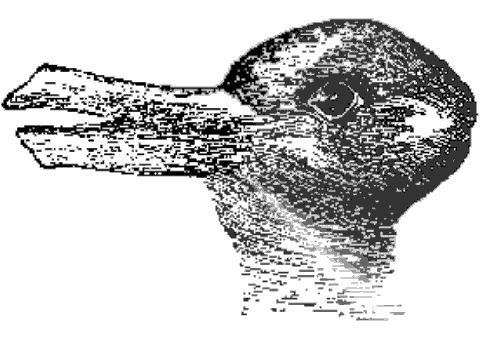
You can flip your mind from seeing it as a rabbit to seeing it as a duck and back again, but not both at the same time.
Both of these images have different ways of seeing them, and your mind flips between the two interpretations. In each interpretation your eyes are seeing the same image. Nothing changes in your visual field in terms of the pattern of light and dark projected on your retinas in your eyes. Nevertheless, there is definitely a difference, and it is a very fundamental difference that you perceive directly. The punchline here is that it is impossible to draw a line between seeing something, and seeing something as something. Seeing vs. seeing-as.
"Aha!," say the physicalists. "What you thought of as some kind of mysterious spooky direct perception, and which you named 'qualia' is, in fact, just some more cognition, one of those 'easy' problems. You don't 'directly perceive' anything - you judge it to be whatever you perceive it as. There is no such thing as qualia, it's just cognition all the way down."
"Not so fast," say the qualophiles. "You are right that it is impossible to separate qualitative perception from our judgments and interpretations. This just means that in some freaky way, our thoughts are made of qualia, not just decorated with them. It is not cognition all the way down, but qualia all the way up."
Always more of an accusation than an actual position anyone claims as their own (like dualism in this regard.) Dennett is called an eliminativist. He says no: he believes in qualia, just as he believes in magic. It's just that what he calls fake magic and real magic are the reverse of what a little kid, for example, might call fake and real magic.
This position is an extension of the recognition that we are only directly aware of, and thus only truly certain of, consciousness in ourselves, and we only assume it in others. Who is to say that everyone else isn't a zombie? Solipsism is the position that you are the only consciousness in the universe. There is no sure argument against solipsism. That said, it is one of those terms that is used more as an accusation than a claim people make about themselves, like dualism and eliminativism.
Identity theory is the farthest extreme of the physicalist line of thought. It says that a mind just is a brain, end of story.
Functionalism is a little broader than identity theory. It says that it is not the brain itself that is important, but the higher-level design, the higher-level organization. One key term is multiple realizability. Functionalists see the human brain as one particular implementation of a mind, but there could be others, like, say, an appropriately programmed computer, or a sufficiently complex network of beer cans connected together with dental floss. The thing that makes a mind a mind is its functional breakdown. Functionalism is a pretty broad category of theories.

All around us, amazing things turn out to be the result of a whole lot of surprisingly simple things at another lower level. "More is different."
The liquidity emerges from the H2O, the flock emerges from the birds. Consciousness emerges from the workings of lots and lots of unconscious parts as a system property.
No, more only seems different due to your perceptual and cognitive limitations. If we were God, there would be no "emergence".
Qualophiles, even if they deny being dualists, have the old dualists' problem: even if there is some magical thing happening with qualia, how on earth does it interact with the good old matter that scientists study? Dennett sneeringly asks if the qualophiles believe in "wonder tissue".
If the brain scientists complete their project, and explain everything about our behavior in terms of neurons, you can go ahead and ask what it's like to see red, but even if there is something to this qualia talk, what actual influence could it possibly have? All the behavior comes from the neurons obeying the laws of physics. This is the essence of epiphenomenalism. Even if qualia are real, they can't do anything to influence our behavior, even our talking and writing about qualia! Naturally, this sort of discussion ends up becoming an argument about free will, but that could take a while, so I won't go there.
Epiphenomenalism stems from a concern about what we call overdetermination: we already have perfectly good scientific explanations for why our brains behave as they do, and how they make our muscles go, and that leaves no room for whole other explanations of the same things. Once you have one set of facts and laws that describe how something works, for God's sake, stop! Perhaps you have heard of Occam's razor.
To an epiphenomenalist, it is as though the arrow of causation only goes one way: stuff that happens in the physical world to our physical nerves definitely affects qualia, but it looks pretty impossible that qualia could affect our physical nerves. But then again, it might be just as hard to answer the question about how even the first arrow works: how do nerves affect qualia?
HOT is a kind of functionalism. Basically, you have lower order thoughts and higher order thoughts. The lower order thoughts are the ones formed directly by contact with the outside world through the nervous system. The lower order thoughts are where the qualia live, kind of, except that they are unconscious. They get conscious by virtue of the higher order thoughts being about them. So it is not enough to have direct perceptions to have conscious qualia, you also have to have thoughts about the qualia, kind of like part of your mind turned toward the world, and another part of your mind turned toward that first part.
HOT theories, to my mind, attempt to get at what I call the troubling second-orderliness of consciousness. That is, the difficulty we have in separating perceiving something and knowing or perceiving that we perceive it. As we see red, we reflect on the fact that we see red, we process the qualia cognitively.
Just to name drop, one of the foremost proponents of HOT is David Rosenthal.
So even if you are a qualophile, you have to answer the question, how would any of this work? It's great to raise questions about qualia, but you still have to at least point in the direction of some answers. How would any magical qualia get cashed out in the real world of physics, neurons, and stuff like that?
Panpsychism: "mind everywhere".
Not "rocks think". Sure, it's all just physics, but do we really know what "physics" means? Do we mean the stuff out there that physics talks about, or do we mean that stuff, thought of only in the way that physics, the branch of science practiced by humans, knows how to talk about it?
Panpsychists believe (generally) that the stuff out there in the "physical" world is all there is, but our ways of talking about it scientifically are incomplete. There is something along with the fundamental properties we (as scientists) know and love: mass, charge, spin, that either is consciousness, or some kind of crumb or spark that can be built up into consciousness in the appropriate kinds of systems. Our brains happen to be such a system.
How could this work? It turns out that at the lowest levels, physics isn't so mechanical after all. Quantum mechanics tells us that reality is actually weirder and more fluid than Isaac Newton could have imagined. Not all versions of panpsychism, I should point out, depend on the weirdness of quantum mechanics.
This seems like a philosophically extravagant theory. One one hand, we have this fine scientific way of looking at the world that seems to explain everything except for this one thing, consciousness, so in order to explain that, you say there's a whole other layer underneath all of reality. In order to take such an extravagant theory seriously, you must think we have a really big problem to solve. You are definitely one of the qualophiles.
In the Leibniz quote above about the mill, he said that perception (i.e. qualia) must be a "simple substance", and not some complicated thing made from parts. This is a pretty definite symptom of panpsychism. He is saying that a perceiving mind can't be made of any non-mind stuff arranged in some fancy way, but that it must simply be some basic element of the universe, some fundamental aspect of reality, or at least a fundamental aspect of matter.
Panpsychists, then, are anti-reductionists, in the sense that they think that while reductionism is great for some things (like figuring out that hurricanes are just made of molecules, or that granite is just made of whatever elements granite is made of), there are some seemingly complex things (namely consciousness) that just can't be broken down any further.
Every now and then, the big two superhero comic companies, Marvel and D.C. try to come up with explanations for how the various super powers work. These often involve extra dimensions, or force fields, or something. It's always a little silly, and it leaves you with a feeling that you'd rather just suspend disbelieve and not think too hard about how Superman flies or how Bruce Banner turns into the Hulk and back again. Panpsychism can leave you with a similar feeling of a cheesily made-up answer to a problem.
The panpsychists, of course, say, well, what's your explanation then?
by a show of hands, are you a) a physicalist/materialist, b) a qualophile, or c) are you undecided, or think the whole problem is a false distinction, that there is some third way?
I've tried to be fair here, so I am curious: by a show of hands, do you think I am a physicalist or a qualophile or neither?